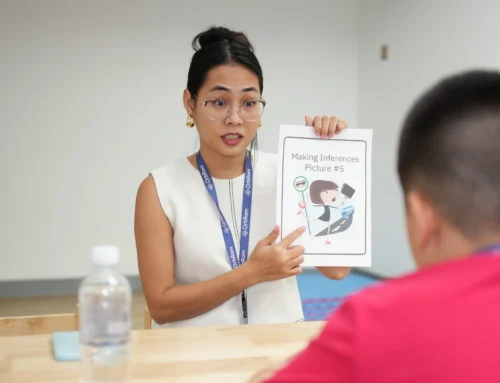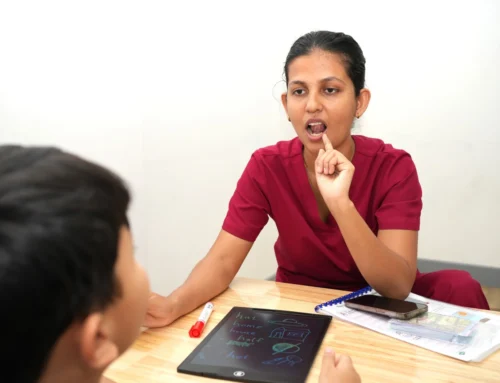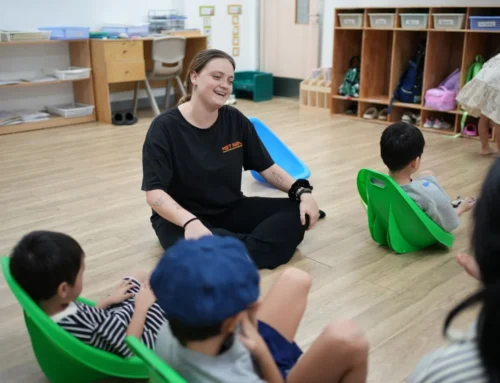Speech therapy classroom strategies are essential tools for teachers supporting children with communication challenges. In Cambodia, where classrooms often include learners from multilingual and diverse backgrounds, teachers play a vital role in reinforcing speech and language skills. By integrating simple, evidence-based strategies into daily routines, educators can help students strengthen their communication abilities and build confidence — both inside and outside the classroom.
Understanding the Role of Teachers in Speech Development
Teachers are often the first to notice when a child struggles to express themselves clearly or follow verbal instructions. While speech therapy sessions focus on individualized goals, classroom environments offer consistent opportunities for practice. Through collaboration between teachers and speech-language pathologists (SLPs), students receive consistent support that enhances speech development and language comprehension.
At OrbRom Center in Phnom Penh, speech therapists often partner with schools to create communication-friendly classrooms. These partnerships ensure that strategies used during speech therapy sessions are reinforced in daily learning, promoting faster and more sustainable progress.
Key Speech Therapy Strategies Teachers Can Use
1. Model Clear and Correct Speech
One of the simplest yet most powerful techniques is speech modeling. Teachers should speak slowly, use clear pronunciation, and emphasize correct grammar naturally. When students hear accurate speech patterns repeatedly, they are more likely to imitate and internalize them.
For example, instead of correcting a student directly (“No, say it this way”), try recasting — repeating the child’s phrase correctly within a natural response.
Student: “He goed to the park.”
Teacher: “Yes, he went to the park! That sounds fun.”
This approach provides gentle correction without discouraging the child’s confidence.
For more ideas, read OrbRom’s guide on top speech therapy exercises you can try at home — many of which can be adapted for classroom use.
2. Use Visual Supports and Cues
Visual aids like picture cards, charts, and gestures are powerful tools for reinforcing understanding. Many children with speech or language delays benefit from visual prompts that accompany spoken instructions. Teachers can display visual schedules, emotion charts, or labeled classroom objects to strengthen word associations and sentence comprehension.
In inclusive schools across Phnom Penh, educators often integrate visual communication boards or AAC tools (Augmentative and Alternative Communication) to help nonverbal students express their needs. Learn more about AAC and how it supports communication at OrbRom’s post on augmentative and alternative communication apps.
3. Encourage Turn-Taking and Conversation Practice
Structured speaking opportunities like “show and tell,” storytelling circles, or peer interviews help children practice turn-taking, listening, and expressive language. Teachers can assign “communication partners” or small groups to encourage students to speak in a low-pressure environment.
In Cambodia’s multilingual classrooms, this strategy also helps bridge language differences, giving all learners the confidence to communicate regardless of their first language. Activities like singing, reading aloud, or repeating rhyming patterns can also boost pronunciation and rhythm awareness — important components of speech development.
4. Create a Language-Rich Environment
A language-rich classroom is filled with labels, discussions, and opportunities for interaction. Teachers can narrate activities (“We’re washing our hands before lunch”), ask open-ended questions (“What do you think will happen next?”), and describe emotions (“You look excited about this project”).
These small actions expand vocabulary and encourage expressive communication throughout the day. To further enhance these skills, schools can collaborate with professionals who provide special needs interventions tailored to each student’s learning profile.
5. Collaborate with Speech Therapists and Parents
Effective speech support requires teamwork. Teachers should maintain open communication with both therapists and parents to ensure consistency. After each assessment or progress update, teachers can reinforce key targets — such as articulation sounds, sentence structures, or comprehension exercises — during regular lessons.
At OrbRom Center, collaboration between teachers and therapists often includes shared strategies, joint observations, and parent workshops. This partnership ensures that children receive consistent support across environments, leading to stronger communication outcomes.
How Schools in Phnom Penh Benefit from Classroom Speech Strategies
Schools that integrate speech therapy principles into everyday teaching often see improvements in student participation, literacy development, and social interaction. These benefits extend beyond children with identified speech delays — they help all learners communicate more clearly and confidently.
For younger students, integrating such strategies into preschool programs builds strong foundations for reading and language comprehension. Older students gain self-advocacy skills, learning how to express their needs and ideas effectively.
Conclusion
Speech therapy classroom strategies empower teachers to support every child’s communication journey. By combining thoughtful instruction, collaboration with professionals, and inclusive classroom practices, schools across Cambodia can create environments where all students find their voices.
For comprehensive support, teachers and school leaders can partner with OrbRom Center’s Speech Therapy team in Phnom Penh. Together, they can nurture confident communicators who thrive both academically and socially.
We are the only Preschool specialized on children with special needs in PhnomPenh.
- Internationally qualified teachers
- Cambodia’s largest sensory room
- Outdoor swimming pool
- Covered outdoor playground
📞 Phone: 077.455.993
Telegram Link: https://t.me/OrbRom





